- Home
- Roger Zelazny
Isle Of The Dead Page 2
Isle Of The Dead Read online
Page 2
"... And find some more recipes for yourself while you're at it."
"I'll keep vun eye open, sir."
"It must be a funny feeling, preparing meals the taste of which you can't even guess at."
"Oh no, sir," he protested. "The tasters are completely reliable, and vile I'll admit I'fe often speculated as to the taste of some of your meals, the closest situation iss, I suppose, that of being a chemist who does not really vish to taste all of his experiments, if you know vatt I mean, sir."
He held the basket of rolls in one hand, the pot of coffee in his other hand, the dish of cole slaw in his other hand, and his other hand rested on the cart's handle. He was a Rigelian, whose name was something like Mmmrt'n Brrm'n. He'd learned his English from a German cook, who'd helped him pick an English equivalent for Mmmrt'n Brrm'n. A Rigelian chef, with a good taster or two from the subject race, prepares the greatest meals in the galaxy. They're quite dispassionate about it, too. We'd been through the just-finished discussion before, many times, and he knew I was always kidding him when I talked that way, trying to get him to admit that human food reminded him of garbage, manure or industrial wastes. Apparently, there is a professional ethic against acknowledging any such thing. His normal counter is to be painfully formal. On occasion, however, when he's had a bit too much of lemon juice, orange juice or grapefruit juice, he's as much as admitted that cooking for _homo sapiens_ is considered the lowest level to which a Rigelian chef can stoop. I try to make up to him for it as much as I can, because I like him as well as his meals, and it's very hard to get Rigelian chefs, no matter how much you can afford to spend.
"Martin," I said, "if anything should happen to me this time out, I'd like you to know that I've made provision for you in my will."
"I--I don't know vatt to say, sir."
"So don't," I told him. "To be completely selfish about it, I hope you don't collect. I plan on coming back."
He was one of the few persons to whom, with impunity yet, I could mention such a thing. He had been with me for thirty-two years and was well past the point which would entitle him to a good lifetime pension anyway. Preparing meals was his dispassionate passion, though, and for some unknown reason he seemed to like me. He'd make out quite a bit better if I dropped dead that minute, but not enough to really make it worth his while to lace my cole slaw with Murtanian butterflyvenom.
"Look at that sunset, will you!" I decided.
He watched for a minute or two, then said, "You certainly do them up brown, sir."
"Thank you. You may leave the Cognac and cigars now and retire. I'll be here awhile."
He placed them on the table, drew himself up to his full eight feet of height, bowed, and said, "Best of luck on your churney, sir, and good efening."
"Sleep well," I said.
"Thank you," and he slithered away into the twilight.
When the cool night breezes slipped about me and the toadingales in their distant wallows began a Bach cantata, my orange moon Florida came up where the sun had gone down. The night-blooming danderoses spilled their perfumes upon the indigo air, the stars came on like aluminum confetti, the ruby-shrouded candle sputtered on my table, the lobster was warm and buttery in my mouth and the champagne cold as the heart of an iceberg. I felt a certain sadness and the desire to say "I will be back" to this moment of time.
So I finished the lobster, the champagne, the sherbert, and I lit a cigar before I poured a snifter of Cognac, which, I have been told, is a barbaric practice. I toasted everything in sight to make up for it, and then poured a cup of coffee.
When I had finished, I rose and took a walk around that big, complex building, my home. I moved up to the bar on the West Terrace and sat there with a Cognac in front of me. After a time, I lit my second cigar. Then she appeared in the archway, automatically falling into a perfume-ad pose.
Lisa wore a soft, silky blue thing that foamed about her in the light of the terrace, all sparkles and haze. She had on white gloves and a diamond choker; she was ash-blonde, the angles and curves of her pale-pink lips drawn up so that there was a circle between them, and she tilted her head far to one side, one eye closed, the other squinting.
"Well-met by moonlight," she said, and the circle broke into a smile, sudden and dewy, and I had timed it so that the second moon, pure white, was rising then in the west. Her voice reminded me of a recording stuck on a passage at middle C. They don't record things on discs that stick that way any more, but even if no one else remembers, I do.
"Hello," I said. "What are you drinking?"
"Scotch and soda," she said, as always. "Lovely night!"
I looked into her two too blue eyes and smiled. "Yes," as I punched out her order and the drink was made and delivered, "it is."
"You've changed. You're lighter."
"Yes."
"You're up to no good, I hope."
"Probably." I passed it to her. "It's been what? --Five months now?"
"A bit more."
"Your contract was for a year."
"That's right."
I passed her an envelope, and, "This cancels it," I said.
"What do you mean?" she asked, the smile freezing, diminishing, gone.
"Whatever I say, always," I said.
"You mean I'm dismissed?"
"I'm afraid so," I told her, "and here's a similar amount, to prove to you it isn't what you think." I passed her the second envelope.
"What is it, then?" she asked.
"I've got to go away. No sense to your wilting here in the meantime. I might be gone quite awhile."
"I'll wait."
"No."
"Then I'll go with you."
"Even if it means you might die along with me, if things go bad?"
I hoped she'd say yes. But after all this time I think I know something about people. That's why Reference A was handy.
"It's possible, this time around," I said. "Sometimes a guy like me has to take a few risks."
"Will you give me a reference?" she said.
"I have it here."
She sipped her drink.
"All right," she said.
I passed it to her.
"Do you hate me?" she asked.
"No."
"Why not?"
"Why?"
"Because I'm weak, and I value my life."
"So do I, though I can't guarantee it."
"That's why I'll accept the referral."
"That's why I have it ready."
"You think you know everything, don't you?"
"No."
"What will we do tonight?" she asked, finishing her drink.
"I don't know everything."
"Well, I know something. You've treated me all right."
"Thanks."
"I'd like to hang onto you."
"But I just scared you?"
"Yes."
"Too much?"
"Too much."
I finished my Cognac, puffed on the cigar, studied Florida and my white moon Cue Ball.
"Tonight," she said, taking my hand, "you'll at least forget to hate me."
She didn't open her envelopes. She sipped her second drink and regarded Florida and Cue Ball also.
"When will you leave?"
"Ere dawn," I said.
"God, you're poetical."
"No, I'm just what I am."
"That's what I said."
"I don't think so, but it's been good knowing you."
She finished her drink and put it down.
"It's getting chilly out here."
"Yes."
"Let us repair within."
"I'd like to repair."
I put down my cigar and we stood and she kissed me. So I put my arm around her trim and sparkling, blue-kept waist and we moved away from the bar, toward the archway, through the archway and beyond, into the house we were leaving.
Let's make it a triple-asterisk break:
* * *
Perhaps the wealth I acquired along the way to becomi
ng who I am is one of the things that made me one of the things that I am; i.e., a bit of a paranoid. No.
It's too pat.
I could justify the qualms I feel each time I leave Homefree by saying that this is their source. Then I could turn around and justify that, by saying that it isn't really paranoia if there really are people out to get you. And there are, which is one of the reasons things are arranged to such an extent that I could stand all alone on Homefree and defy any man or government that wanted me to come and take me. They'd have to kill me, which would be a fairly expensive proposition, as it would entail destroying the entire planet. And even then, I think I've got an out that might work, though I've never had to test it under field conditions.
No, the real reason for my qualms is the very ordinary fear of death and non-being that all men know, intensified many times, though once I had a glimpse of a light that I can't explain ... Forget that. There's me and maybe a few Sequoia trees that came onto the scene in the twentieth century and have managed to make it up until now, the thirty-second. Lacking the passivity of the plant kingdom, I learned after a time that the longer one exists the more strongly one becomes infected with a sense of mortality. Corollary to this, survival--once a thing I thought of primarily in Darwinian terms, as a pastime of the lower classes and phyla--threatens to become a preoccupation. It is a much subtler jungle now than it was in the days of my youth, with something like fifteen hundred inhabited worlds, each with its own ways of killing men, ways readily exportable when you can travel between the worlds in no time at all; seventeen other intelligent races, four of whom I consider smarter than men and seven or eight who are just as stupid, each with its own ways of killing men; multitudes of machines to serve us, numerous and ordinary as the automobile was when I was a kid, each with its own ways of killing men; new diseases, new weapons, new poisons and new mean animals, new objects of hatred, greed, lust and addiction, each with its own ways of killing men; and many, many, many new places to die. I've seen and met a lot of these things, and because of my somewhat unusual occupation there may be only twenty-six people in the galaxy who know more about them than I do.
So I'm scared, even though no one's shooting at me just now, the way they were a couple weeks before I got sent to Japan for rest and recuperation and found Tokyo Bay, say twelve hundred years ago. That's close. That's life.
* * *
I left in the dead of pre-dawn night without purposely saying goodbye to anybody, because that's the way I figure I have to be. I did wave back at a shadowy figure in the Operations Building who had waved at me after I'd parked my buggy and had begun walking across the field. But then, I was a shadowy figure, too. I reached the dock where the _Model T_ sat squat, boarded her, stowed my gear, spent half an hour checking systems. Then I went outside to inspect the phase-projectors. I lit a cigarette.
In the east, the sky was yellow. A rumble of thunder came out of the dark mountains to the west. There were some clouds above me and the stars still clung to sky's faded cloak, less like confetti than dewdrops now.
For once, it wasn't going to happen, I decided.
Some birds sang, and a gray cat came and rubbed against my leg, then moved off in the direction of the birdsongs.
The breeze shifted so that it came up from the south, filtered through the forest that began at the far end of the field. It bore the morningdamp smells of life and growth.
The sky was pink as I took my last puff, and the mountains seemed to shiver within their shimmering as I turned and crushed it out. A large, blue bird floated toward me and landed on my shoulder. I stroked its plumage and sent it on its way.
I took a step toward the vehicle ...
My toe struck a projecting bolt in a dock-plate and I stumbled. I caught hold of a strut and saved myself from a complete fall. I landed on one knee, and before I could get up a small, black bear was licking my face. I scratched his ears and patted his head, then slapped him on the rump as I rose. He turned and moved off toward the wood.
I tried to take another step, then realized that my sleeve was caught in the place where the strut I had grabbed crossed over another one.
By the time I'd disentangled myself, there was another bird upon my shoulder and a dark cloud of them flapping across the field from the direction of the forest. Above the noise of their cries, I heard more thunder.
It was happening.
I made a dash for the ship, almost stumbling over a green rabbit who sat on her haunches before the hatch, nose twitching, pink, myopic eyes staring in my direction. A big glass snake slithered toward me across the dock, transparent and gleaming.
I forgot to duck my head, banged it on the upper hatchplate and reeled back. My ankle was seized by a blonde monkey, who winked a blue eye at me.
So I patted her head and pulled free. She was stronger than she looked.
I passed through the hatch, and it jammed when I tried to close it.
By the time I'd worked it free, the purple parrots were calling my name and the snake was trying to come aboard.
I found a power-pull and used it.
"All right! Goddamn it!" I cried. "I'm going! Goodbye! I'll be back!"
The lightnings flashed and the thunders rolled and a storm began in the mountains and raced toward me. I worked the hatch free.
"Clear the field!" I yelled, and slammed it.
I dogged it shut, moved to the control seat and activated all systems.
On the screen, I saw the animals departing. Wisps of fog drifted by, and I heard the first drops of rain spattering on the hull.
I raised the ship, and the storm broke about me.
I got above it, left the atmosphere, accelerated, achieved orbit and set my course.
It's always like that when I try to leave Homefree, which is why I always try to sneak away without telling the place goodbye. It never works, though.
Anyway, it's nice to know that somewhere you are wanted.
* * *
At the proper moment, I broke orbit and raced away from the Homefree System. For several hours I was queasy and my hands tended to shake. I smoked too many cigarettes and my throat began to feel dry. Back at Homefree, I had been in charge of everything. Now, though, I was entering the big arena once again. For a moment, I actually contemplated turning back.
Then I thought of Kathy and Marling and Ruth and Nick the long dead dwarf and my brother Chuck, and I continued on to phase-point, hating myself.
It happened suddenly, just after I had entered phase and the ship was piloting itself.
I began laughing, and a feeling of recklessness came over me, just like in the old days.
What did it matter if I died? What was I living for that was so damned important? Eating fancy meals? Spending my nights with contract courtesans? Nuts! Sooner or later Tokyo Bay gets us all, and it would get me one day, too, I knew, despite everything. Better to be swept away in the pursuit of something halfway noble than to vegetate until someone finally figured a way to kill me in bed.
... And this, too, was a phase.
I began to chant a litany in a language older than mankind. It was the first time in many years that I had done so, for it was the first time in many years that I had felt fit to.
The light in the cabin seemed to grow dim, though I was sure it burnt as brightly as ever. The little dials on the console before me receded, became sparks, became the glowing eyes of animals peering at me from out a dark wood. My voice now sounded like the voice of another, coming by some acoustical trick from a point far before me. Within myself, I followed it forward.
Then other voices joined in. Soon my own ceased, but the others continued, faint, high-pitched, fading and swelling as though borne by some unfelt wind; they touched lightly at my ears, not really beckoning. I couldn't make out any words, but they were singing. The eyes were all around me, neither advancing nor receding, and in the distance there was a very pale glow, as of sunset on a day filled with milk-clouds. I realized then that I was asleep and dreaming
, and that I could awaken if I wished. I didn't, though. I moved on into the west.
At length, beneath a dream-pale sky, I came to the edge of a cliff and could go no farther. There was water, water that I could not cross over, pale and sparkling, wraiths of mist folding and unfolding, slowly, above it; and out, far out from where I stood, one arm half-extended, crag piled upon terrace upon cold terrace, rocky buttresses all about, fog-dimmed pinnacles indicating a sky that I could not see, the whole stark as a sandblasted iceberg of ebony, I beheld the source of the singing, and a chillness clutched at my neck and perhaps the hair rose upon it.
I saw the shades of the dead, drifting like the mists or standing, half-hid, by the dark rocks of that place. And I knew that they were the dead, for among them I saw Nick the dwarf, gesturing obscenely, and I saw the telepath Mike Shandon, who had almost toppled an empire, _my_ empire, the man I had slain with my own hands, and there was my old enemy Dango the Knife, and Courtcour Bodgis, the man with the computer mind, and Lady Karle of Algol, whom I had loved and hated.
Then I called upon that which I hoped I could still call upon.
There came a rumble of thunder and the sky grew as bright and blue as a pool of azure mercury. I saw her standing there for a moment, out across those waters in that dark place, Kathy, all in white, and our eyes met and her mouth opened and I heard my name spoken but nothing more, for the next clap of thunder brought with it total darkness and laid it upon that isle and the one who had stood upon the cliff, one arm half-extended. Me, I guess.
* * *
When I awoke, I had a rough idea of what it had meant. A rough idea only. And I couldn't understand it worth a damn, though I tried to analyze it.
I had once created Boecklin's Isle of the Dead to satisfy the whim of a board of unseen clients, strains of Rachmaninoff dancing like phantom sugar plums through my head. It had been a rough piece of work. Especially, since I am a creature who thinks in a mostly pictorial format. Whenever I think of death, which is often, there are two pictures that take turns filling my mind. One is the Valley of Shadows, a big, dark valley beginning between two massive prows of gray stone, with a greensward that starts out twilit and just gets darker and darker as you stare farther and farther into it, until finally you are staring into the blackness of interstellar space itself, _sans_ stars, comets, meteors, anything; and the other is that mad painting by Boecklin, _The isle of the Dead_, of the place I had just viewed in the land of dream. Of the two places, the Isle of the Dead is far more sinister. The Valley seems to hold a certain promise of peace. This, however, may be because I never designed and built a Valley of Shadows, sweating over every nuance and overtone of that emotion-wringing landscape. But in the midst of an otherwise Eden, I had raised up an Isle of the Dead one time, and it had burnt itself into my consciousness to such an extent that not only could I never wholly forget it, but I had become a part of it as surely as it was a part of me. Now, this part of myself had just addressed me in the only way that it could, in response to a sort of prayer. It was warning me, I felt, and it was also giving me a clue, a clue that might make sense as time went on. Symbols, by their very nature, conceal as well as indicate, damn them!

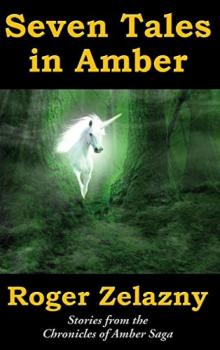 Seven Tales in Amber
Seven Tales in Amber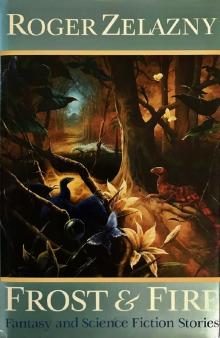 Frost and Fire
Frost and Fire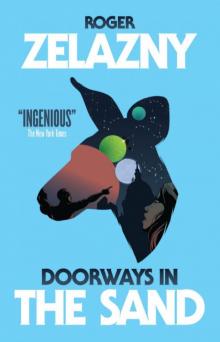 Doorways in the Sand
Doorways in the Sand Unicorn Variation
Unicorn Variation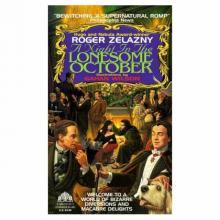 A Night in the Lonesome October
A Night in the Lonesome October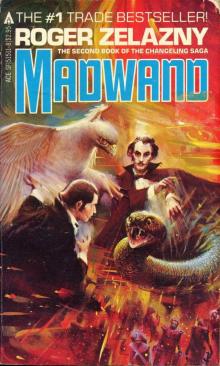 Madwand
Madwand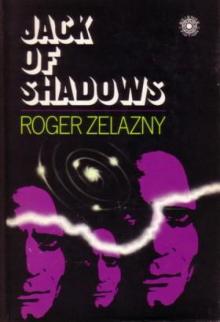 Jack Of Shadows
Jack Of Shadows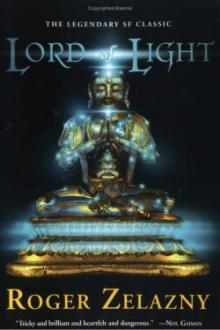 Lord of Light
Lord of Light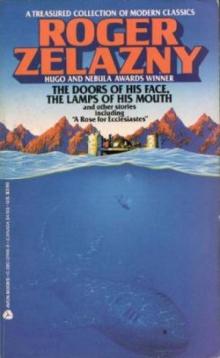 The Doors of His Face, The Lamps of His Mouth and Other Stories
The Doors of His Face, The Lamps of His Mouth and Other Stories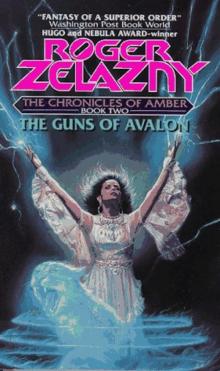 Guns Of Avalon tcoa-2
Guns Of Avalon tcoa-2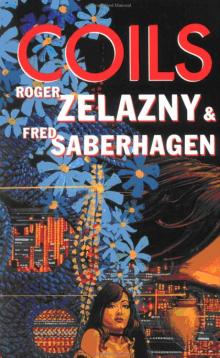 Coils
Coils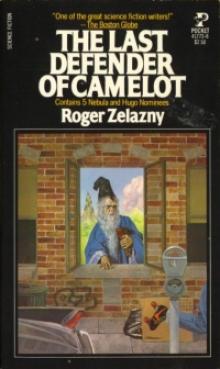 The Last Defender Of Camelot
The Last Defender Of Camelot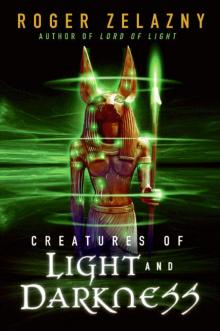 Creatures of Light and Darkness
Creatures of Light and Darkness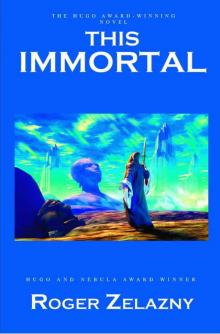 This Immortal
This Immortal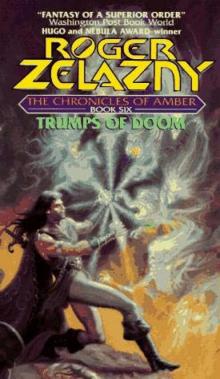 Trumps of doom tcoa-6
Trumps of doom tcoa-6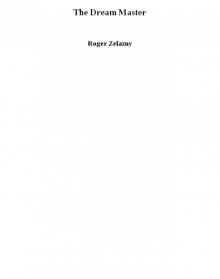 The Dream Master
The Dream Master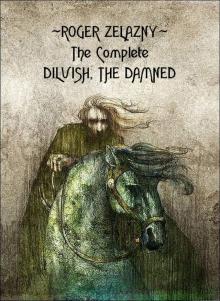 The Complete Dilvish, The Damned
The Complete Dilvish, The Damned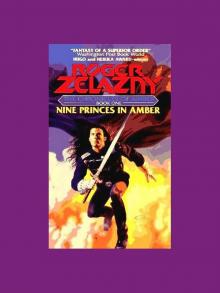 Nine Princes in Amber
Nine Princes in Amber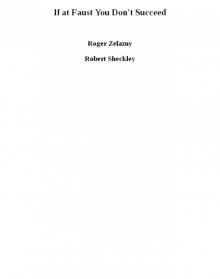 If at Faust You Don't Succeed
If at Faust You Don't Succeed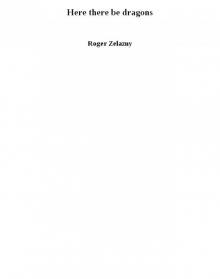 Here there be dragons
Here there be dragons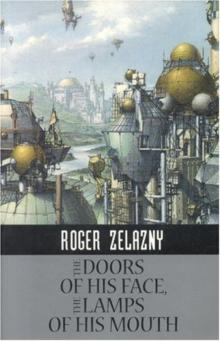 The Doors Of His Face, The Lamps Of His Mouth
The Doors Of His Face, The Lamps Of His Mouth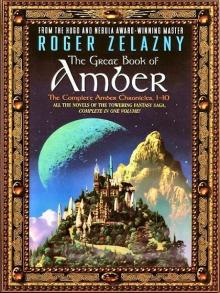 The Great Book of Amber - Chronicles 1-10
The Great Book of Amber - Chronicles 1-10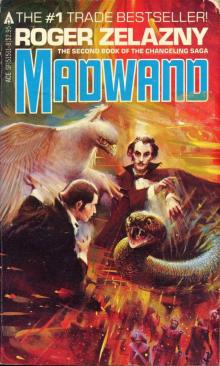 Madwand (Illustrated)
Madwand (Illustrated)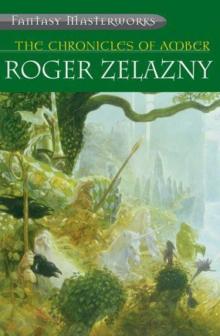 The Chronicles of Amber
The Chronicles of Amber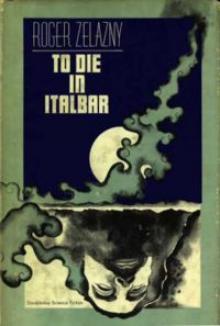 To Die In Italbar
To Die In Italbar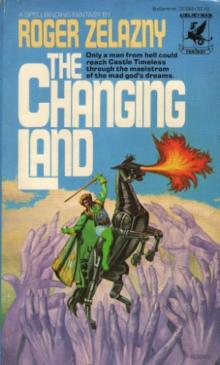 The Changing Land
The Changing Land The Furies
The Furies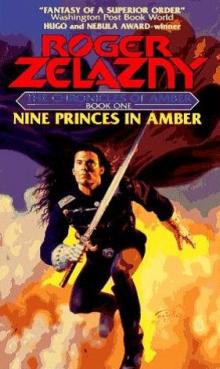 Nine Princes In Amber tcoa-1
Nine Princes In Amber tcoa-1 Last Of The Wild Ones
Last Of The Wild Ones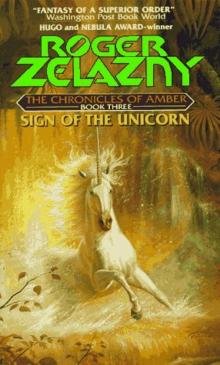 Sign of the Unicorn tcoa-3
Sign of the Unicorn tcoa-3 My Name is Legion
My Name is Legion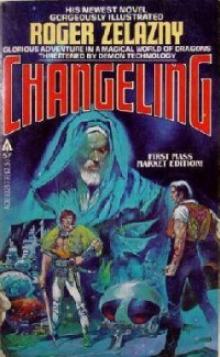 Wizard World 1: Changeling
Wizard World 1: Changeling Changeling
Changeling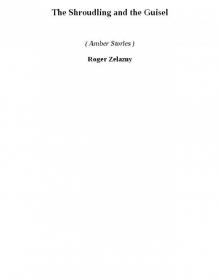 The Shroudling and the Guisel (amber stories)
The Shroudling and the Guisel (amber stories)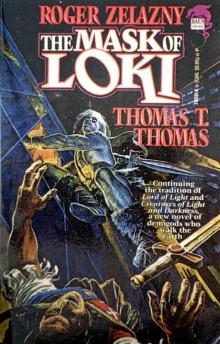 The Mask of Loki
The Mask of Loki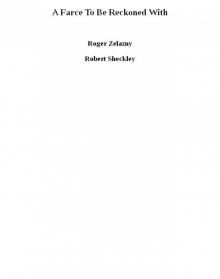 A Farce To Be Reckoned With
A Farce To Be Reckoned With Roadmarks
Roadmarks When Pussywillows Last in the Catyard Bloomed (rtf)
When Pussywillows Last in the Catyard Bloomed (rtf)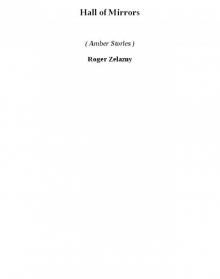 Hall of Mirrors (amber stories)
Hall of Mirrors (amber stories)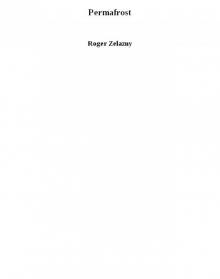 Permafrost
Permafrost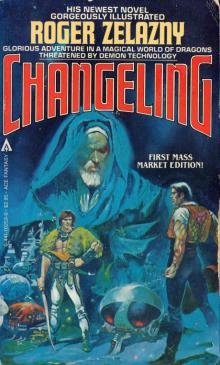 Changeling (Illustrated)
Changeling (Illustrated)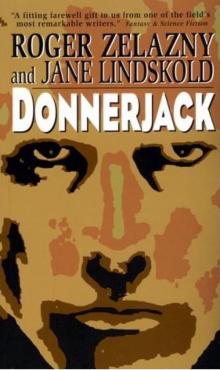 Donnerjack
Donnerjack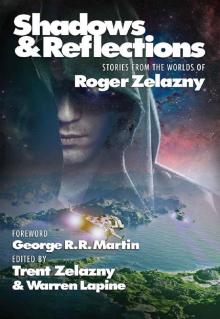 Shadows & Reflections: A Roger Zelazny Tribute Anthology
Shadows & Reflections: A Roger Zelazny Tribute Anthology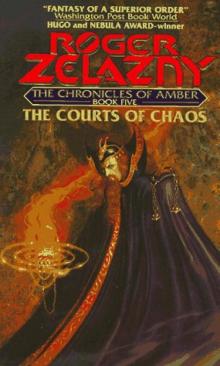 The Courts Of Chaos tcoa-5
The Courts Of Chaos tcoa-5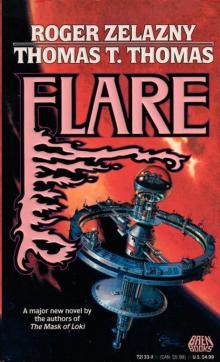 Flare
Flare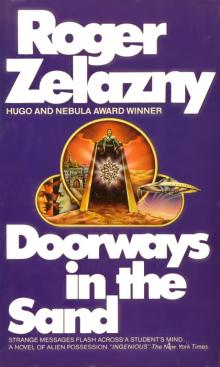 Doorsways in the Sand
Doorsways in the Sand The Great Book of Amber
The Great Book of Amber Home Is the Hangman
Home Is the Hangman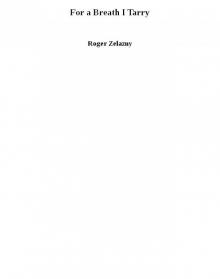 For a Breath I Tarry
For a Breath I Tarry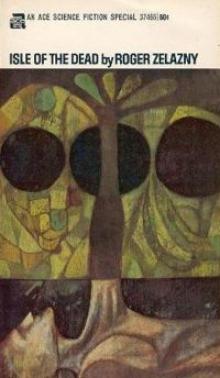 Isle Of The Dead
Isle Of The Dead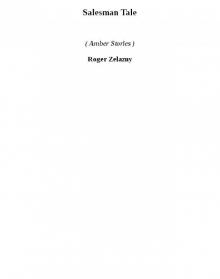 Salesman Tale (amber stories)
Salesman Tale (amber stories) Dismal Light
Dismal Light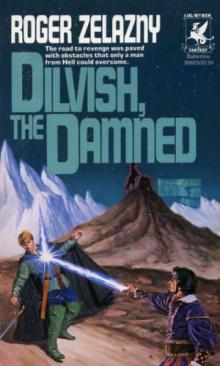 Dilvish, The Damned
Dilvish, The Damned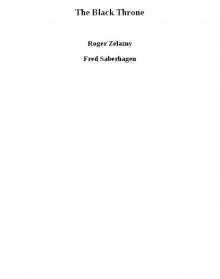 The Black Throne
The Black Throne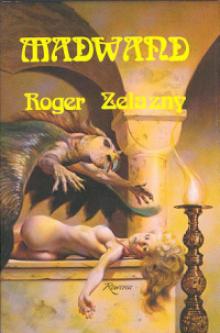 Wizard World 2: Madwand
Wizard World 2: Madwand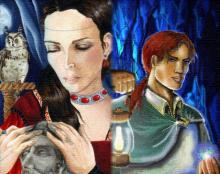 The Salesman's Tale
The Salesman's Tale